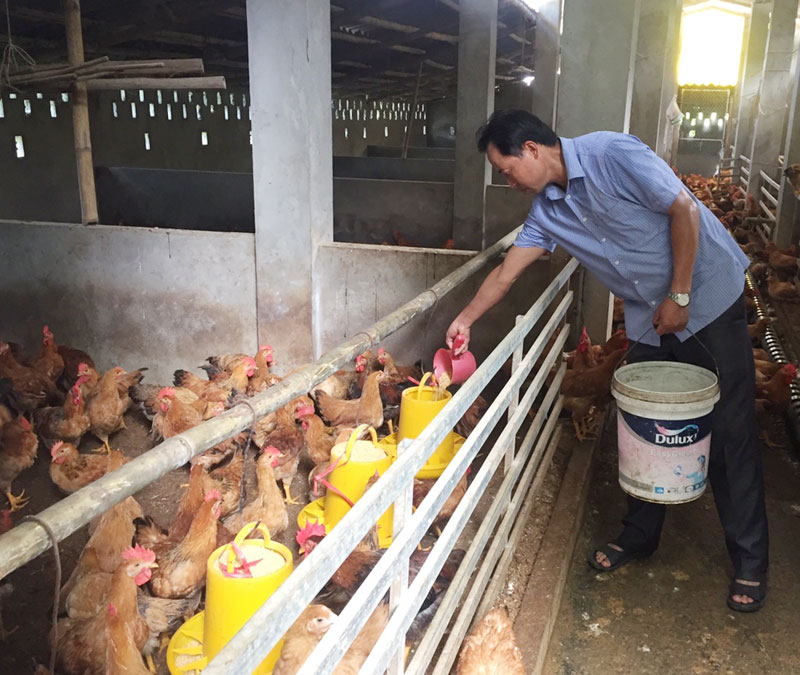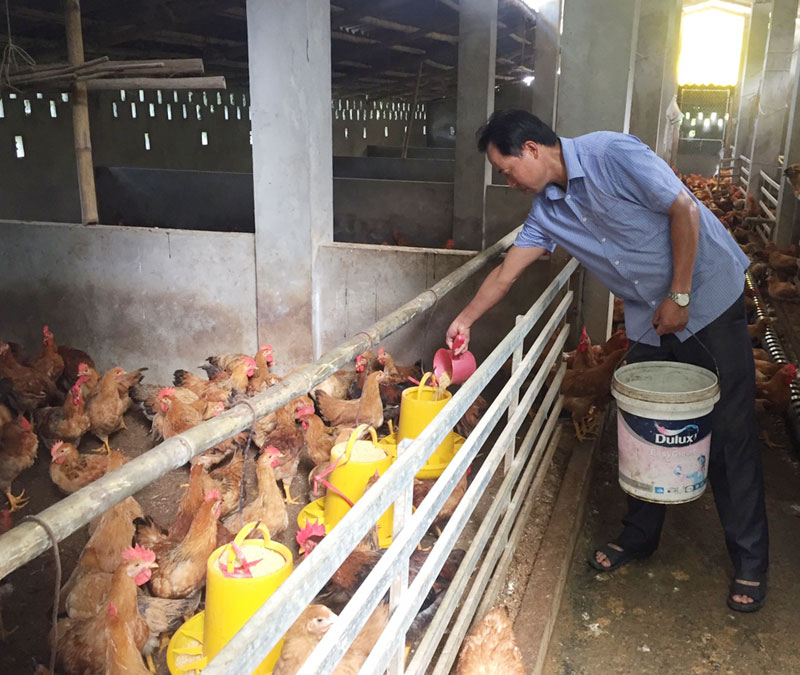
(HBO) – Building new-style agricultural cooperatives as part of value chains is significant to ensure stable sales for local farm produce.
Photo: The safe food cooperative in Yen Phu commune (Lac Son
district) provides clean chickens for the market, which win the approval of many
consumers.
Lac
Thuy is one of the leading localities in Hoa Binh province in developing new-style
cooperatives in association with value chains. Last year, the district carried
out three projects on value chains with total investment of 1.5 billion VND,
with one project on chili pepper and pumpkin production in Yen Bong district
and neighbouring region, another on safe vegetable cultivation in Lac Long and
Dong Tam communes, and the third one on ri chicken farming in Dong Tam and Phu
Thanh communes.
The value chains linked farmers and businesses via cooperatives and cooperative
groups. Firms are responsible for providing farmers with varieties and guidance
in farming techniques, and buying all products. Chili peppers, pumpkins and
vegetables were purchased by the Northern Green Agriculture JSC, Vietnam Chili
Pepper Co., Ltd and the safe farm produce cooperative in Lac Thuy district.
Farmers earn around 180 million VND per hectare, triple the profits from traditional
cultivation of rice and maize.
In 2018, Lac Thuy district develops three value chains in safe vegetable
production, cultivation of Bac Huong 9 rice, and goat breeding.
According to the provincial cooperative alliance, most local cooperatives ’
operation still exposes limitations due to weak capacity, loose links among
cooperatives and between cooperatives and businesses, and slow application of
advanced technologies into production. This results in low productivity as well
as shortage of popular brands and sufficient products for the market.
Under the new model that integrates cooperatives in value chains, farmers will gradually
join in all the three phases in the value chain, from production to
consumption, thus raising the value of their products in a sustainable manner.
This is also an inevitable trend for new-style cooperatives in agriculture./.
According to data from the Hoa Binh Provincial Party Committee, the industrial production index for the first six months of 2025 is estimated to have increased by 20% compared to the same period last year. This marks the highest year-on-year growth rate for this period since 2020.
In the first six months of 2025, Hoa Binh province’s export turnover was estimated at 1.145 billion USD, marking an 18.11% increase compared to the same period in 2024. Import turnover was estimated at $ 804 million, a 17.15% increase, which helped the province maintain a positive trade balance.
The lives of the ethnic minority farmers in Tan Lac district have gradually improved thanks to the new directions in agricultural production. This is a testament to the collective strength fostered through the professional associations and groups implemented by various levels of the district’s Farmers’ Union.
With the motto the "product quality comes first,” after nearly one year of establishment and operation, Muong village’s Clean Food Agricultural and Commercial Cooperative, located in Cau Hamlet, Hung Son Commune (Kim Boi district), has launched reputable, high-quality agricultural products to the market that are well-received by consumers. The products such as Muong village’s pork sausage, salt-cured chicken, and salt-cured pork hocks have gradually carved out a place in the market and they are on the path to obtaining the OCOP certification.
In the past, the phrase "bumper harvest, rock-bottom prices" was a familiar refrain for Vietnamese farmers engaged in fragmented, small-scale agriculture. But today, a new spirit is emerging across rural areas of Hoa Binh province - one of collaboration, organisation, and collective economic models that provide a stable foundation for production.
Maintaining growing area codes and packing facility codes in accordance with regulations is a mandatory requirement for agricultural products to be eligible for export. Recently, the Department of Agriculture and Environment of Hoa Binh province has intensified technical supervision of designated farming areas and packing facilities to safeguard the "green passport" that enables its products to access international markets.



